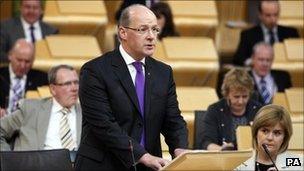The Scottish budget fight begins
- Published
- comments

Finance Secretary John Swinney delivers his budget statement to MSPs
It was never going to be easy. John Swinney was coping with a financial envelope from the UK Government which is decidedly slimmer than in the past - with particular cuts in capital spending.
On the day, in the chamber, he performed well: in part, because he had new thinking to impart.
Rather than simply handing out the sweeties - in smaller bundles - he outlined a new approach to shaping Scotland's economy in tight times including a shift from revenue to capital.
As billed here, a flurry of acronyms. NPD, TIF and the rest.
All adding up to innovative ways of prising productive investment and endeavour from the private and third sectors, in order to bolster the economy.
Of course, it's tough. But it's double handed.
Mr Swinney is protecting the NHS - but health service professionals warn that high cost inflation will erode that.
There is more money for universities but colleges are unhappy.
Step up rhetoric
Big retailers are upset over the restoration of a tax on large shops, now linked to selling alcohol and tobacco, which could raise some £30m.
There is a pay freeze in the public sector for those earning more than £21k - but an extended council tax freeze.
But the big controversy could now rest between central and local government. It is now undoubtedly farewell to the concordat, occasionally billed as historic, between Ministers and Cosla.
John Swinney is adamant that he still wants to talk, to consul, to co-operate. But councils see this budget as an imposition. Stand by for a fight.
More generally, though, Mr Swinney has political advantages on his side.
The response from his political opponents in the chamber was, relatively, modulated although they may step up the rhetoric as the details are studied and scrutiny begins.
And he has a majority. He can shape the budget to his will, albeit within overall plans laid down elsewhere.
Which, of course, is another battle entirely - and one which is the leitmotif of this parliament.